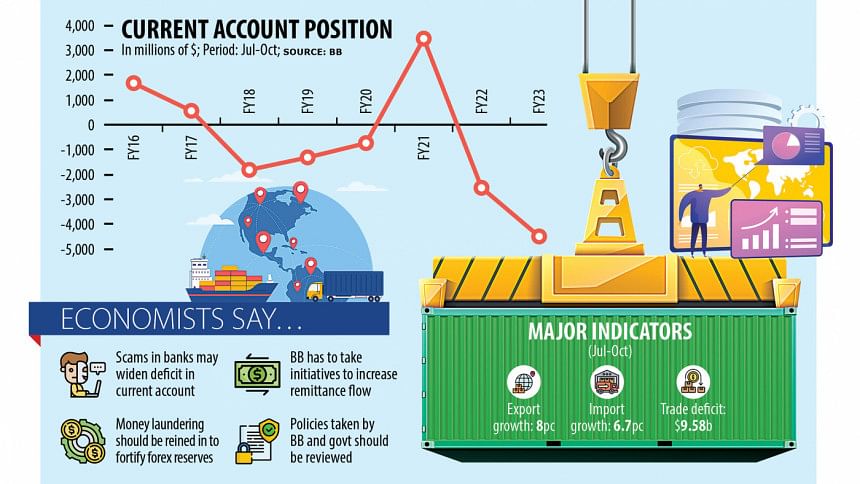Current account deficit widens further

Bangladesh's current account deficit widened further in October as imports continued to surge compared to the combined receipts from exports and remittances.
The current account records a nation's transactions with the rest of the world, specifically its net trade in goods and services.
For Bangladesh, it stood at $4.5 billion in deficit at the end of October, data from the Bangladesh Bank showed. A year earlier, the current account had posted a deficit of $3.83 billion, a reverse from the corresponding period in 2020 when it was a surplus of $4.05 billion.
The widening of the deficit means the pressure on the foreign exchange market has continued to be high.
Ahsan H Mansur, executive director of the Policy Research Institute of Bangladesh, says the lower inflow of remittances points to the ongoing capital flight.
But more than 7.84 lakh male and female workers went to various countries from Bangladesh between January and August in search of jobs, up 191 per cent year-on-year, data from the Bureau of Manpower Employment and Training showed.
The massive outflow of foreign workers was supposed to play a key role in giving a boost to remittance earnings. But money transferred by the workers was up only 2.03 per cent at $7.2 billion between July and October.
Some unscrupulous entities and people are now laundering money abroad through trade under and over-invoicing. They are now carrying out illegal transactions by persuading migrant workers to send money back home by offering them better rates for the US dollar compared to the rates offered by banks in Bangladesh.
"If under- and over-invoicing can be tackled, the hundi cartel will weaken," said Mezbaul Haque, the spokesperson of the central bank, on Monday.
Over-invoicing takes place when exporters submit an inflated invoice to importers, generating a payment that exceeds the value of the shipped goods to launder money abroad.
Under-invoicing happens when the price of a good on an invoice is less than the price paid. It usually happens when either the importer or exporter wants to reduce a tariff or if the buyer or seller wants to lower their profits to pay fewer taxes.
"It is widely reported that some delinquent borrowers have recently siphoned off money from the banking sector," said Mansur.
"The vested quarters might have laundered money abroad by embezzling funds from the banking sector."
Mansur warned that if the ongoing capital flight can't be stopped, it will be difficult to manage the deficit in the current account.
Exports grew 8 per cent year-on-year to $15.92 billion in July-October.
On the other hand, imports grew 6.72 per cent-year-on-year to $25.51 billion in the four months to October, despite the central bank's move to discourage purchases of products and services from the international markets.
The current account deficit might reduce to some extent as the opening of letters of credit (LCs) has decreased in recent months as banks are not keen to facilitate non-essential and luxury imports amid a tightening of a dollar supply.
The BB has injected around $6.5 billion into the market so far in the current fiscal year to help banks clear import bills after pouring into a record $7.62 in the last fiscal year, which ended in June.
The yawning current account deficit means the exchange rate and the foreign exchange reserves will come under further pressure.
As of November 30, gross foreign exchange reserves stood at $33.78 billion in contrast to $44.88 billion a year earlier, a fall of about 25 per cent.
Amid the shortage of the US dollar, the taka has lost its value by 25 per cent as of December 5 against the American greenback compared to a year earlier.
Zahid Hussain, a former lead economist of the World Bank's Dhaka office, says that policymakers had earlier predicted that the volatility in the foreign exchange market would ease soon.
"But the volatility has not eased."
Many economists have already suggested the central bank allow the market forces to determine the exchange rate of the taka against the dollar. But the central bank has not done so yet, he said.
"The central bank has taken a number of policy measures, but there is no visible output in the foreign exchange market. Policymakers should examine whether their policies have yielded any effective results."
Hussain urged the government to root out financial scams in order to reduce the deficit in the current account.

 For all latest news, follow The Daily Star's Google News channel.
For all latest news, follow The Daily Star's Google News channel. 



Comments